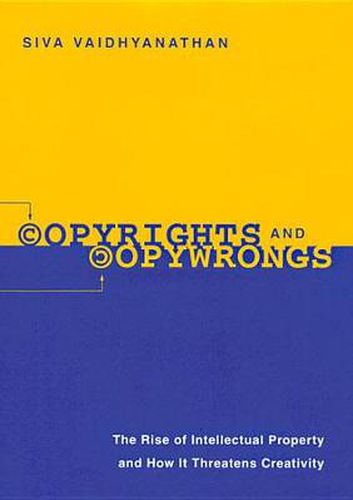Readings Newsletter
Become a Readings Member to make your shopping experience even easier.
Sign in or sign up for free!
You’re not far away from qualifying for FREE standard shipping within Australia
You’ve qualified for FREE standard shipping within Australia
The cart is loading…






Copyright reflects far more than economic interests. Embedded within conflicts over royalties and infringement are cultural values–about race, class, access, ownership, free speech, and democracy–which influence how rights are determined and enforced. Questions of legitimacy–of what constitutes intellectual property or fair use, and of how to locate a precise moment of cultural creation–have become enormously complicated in recent years, as advances in technology have exponentially increased the speed of cultural reproduction and dissemination. In Copyrights and Copywrongs, Siva Vaidhyanathan tracks the history of American copyright law through the 20th century, from Mark Twain’s vehement exhortations for thick copyright protection, to recent lawsuits regarding sampling in rap music and the digital moment, exemplified by the rise of Napster and MP3 technology. He argues persuasively that in its current punitive, highly restrictive form, American copyright law hinders cultural production, thereby contributing to the poverty of civic culture. In addition to choking cultural expression, recent copyright law, Vaidhyanathan argues, effectively sanctions biases against cultural traditions which differ from the Anglo-European model. In African-based cultures, borrowing from and building upon earlier cultural expressions is not considered a legal trespass, but a tribute. Rap and hip hop artists who practice such borrowing by sampling and mixing, however, have been sued for copyright violation and forced to pay substantial monetary damages. Similarly, the oral transmission of culture, which has a centuries-old tradition within African American culture, is complicated by current copyright laws. How, for example, can ownership of music, lyrics, or stories which have been passed down through generations be determined? Upon close examination, strict legal guidelines prove insensitive to the diverse forms of cultural expression prevalent in the United States, and reveal much about the racialized cultural values which permeate our system of laws. Ultimately, copyright is a necessary policy that should balance public and private interests but the recent rise of intellectual property as a concept have overthrown that balance. Copyright, Vaidhyanathan asserts, is policy, not property. Bringing to light the republican principles behind original copyright laws as well as present-day imbalances and future possibilities for freer expression and artistic equity, this volume takes important strides towards unraveling the complex web of culture, law, race, and technology in today’s global marketplace.
$9.00 standard shipping within Australia
FREE standard shipping within Australia for orders over $100.00
Express & International shipping calculated at checkout
Copyright reflects far more than economic interests. Embedded within conflicts over royalties and infringement are cultural values–about race, class, access, ownership, free speech, and democracy–which influence how rights are determined and enforced. Questions of legitimacy–of what constitutes intellectual property or fair use, and of how to locate a precise moment of cultural creation–have become enormously complicated in recent years, as advances in technology have exponentially increased the speed of cultural reproduction and dissemination. In Copyrights and Copywrongs, Siva Vaidhyanathan tracks the history of American copyright law through the 20th century, from Mark Twain’s vehement exhortations for thick copyright protection, to recent lawsuits regarding sampling in rap music and the digital moment, exemplified by the rise of Napster and MP3 technology. He argues persuasively that in its current punitive, highly restrictive form, American copyright law hinders cultural production, thereby contributing to the poverty of civic culture. In addition to choking cultural expression, recent copyright law, Vaidhyanathan argues, effectively sanctions biases against cultural traditions which differ from the Anglo-European model. In African-based cultures, borrowing from and building upon earlier cultural expressions is not considered a legal trespass, but a tribute. Rap and hip hop artists who practice such borrowing by sampling and mixing, however, have been sued for copyright violation and forced to pay substantial monetary damages. Similarly, the oral transmission of culture, which has a centuries-old tradition within African American culture, is complicated by current copyright laws. How, for example, can ownership of music, lyrics, or stories which have been passed down through generations be determined? Upon close examination, strict legal guidelines prove insensitive to the diverse forms of cultural expression prevalent in the United States, and reveal much about the racialized cultural values which permeate our system of laws. Ultimately, copyright is a necessary policy that should balance public and private interests but the recent rise of intellectual property as a concept have overthrown that balance. Copyright, Vaidhyanathan asserts, is policy, not property. Bringing to light the republican principles behind original copyright laws as well as present-day imbalances and future possibilities for freer expression and artistic equity, this volume takes important strides towards unraveling the complex web of culture, law, race, and technology in today’s global marketplace.